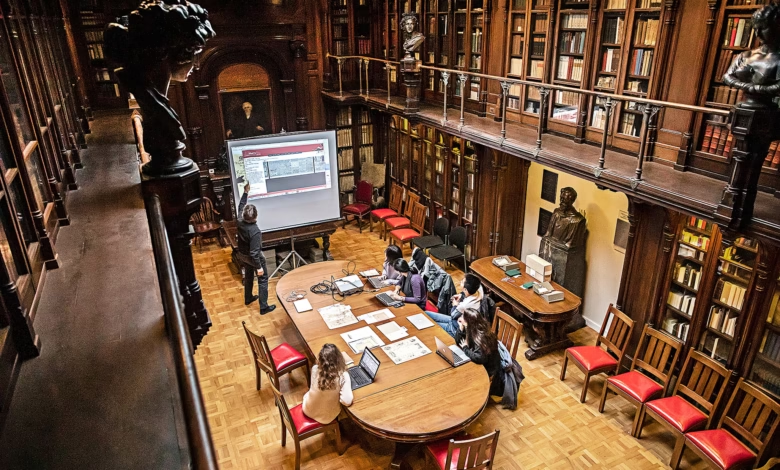Exploring the Treasures of the UPenn Library: A Comprehensive Guide

The upenn library boasts one of the most renowned academic library systems in the world. With a rich history, extensive collections, cutting-edge digital resources, and state-of-the-art facilities, the UPenn Library stands as a cornerstone of academic excellence and innovation. This guide will take you through the vast offerings of the UPenn Library, highlighting its history, notable collections, services, and tips for making the most of its resources.
1. A Brief History of the UPenn Library
The University of Pennsylvania Library dates back to the university’s founding in 1740. Over the centuries, the library has evolved into a world-class institution with more than 8 million print and digital items. The Van Pelt-Dietrich Library Center, the main library building, opened in 1962 and serves as the hub for research and study.
2. The UPenn Library System: An Overview
UPenn’s library system is made up of over 15 specialized libraries, each catering to different academic disciplines. Notable libraries include:
- Van Pelt-Dietrich Library Center: The primary library for humanities and social sciences.
- Fisher Fine Arts Library: Specializes in architecture, art history, and fine arts.
- Biomedical Library: Supports research in health sciences and medicine.
- Lippincott Library: Focuses on business and finance.
- Biddle Law Library: Provides legal resources for law students and faculty.
Each library offers tailored resources, expert staff, and study spaces designed to enhance the learning experience.
3. Notable Collections at the UPenn Library
One of the standout features of the UPenn Library is its vast and diverse collections. These include:
3.1. Rare Books and Manuscripts
The Kislak Center for Special Collections, Rare Books, and Manuscripts is home to priceless historical documents, including medieval manuscripts, early printed books, and materials related to the history of Philadelphia and Pennsylvania.
3.2. Judaica and Hebraica Collections
UPenn’s extensive Judaica and Hebraica collections contain rare Hebrew texts, manuscripts, and printed works that are invaluable to scholars of Jewish history and culture.
3.3. East Asian Collections
The library holds a significant collection of Chinese, Japanese, and Korean texts, covering subjects from history and literature to philosophy and religion.
3.4. Modern and Contemporary Archives
UPenn’s archives also house contemporary materials, including digital archives, photographs, and multimedia collections.
4. Digital Resources and Databases
The UPenn Library offers an impressive array of digital resources. These include:
- E-books and Journals: Access to millions of digital books and journal articles across various disciplines.
- Databases: Specialized databases for business, law, medicine, and the humanities.
- Institutional Repository: ScholarlyCommons, UPenn’s institutional repository, provides open access to research produced by the university.
- Digital Humanities Projects: Interactive and collaborative digital research initiatives.
These resources are accessible remotely, making it easier for students and faculty to conduct research from anywhere.
5. Study Spaces and Collaborative Learning
The UPenn Library offers a variety of study spaces to meet the needs of every student:
- Quiet Study Rooms: Designated for silent study.
- Group Study Rooms: Equipped with whiteboards and AV technology for collaborative work.
- 24/7 Study Areas: Certain library areas remain open around the clock during finals season.
- Specialized Spaces: Makerspaces and innovation labs for hands-on learning.
6. Research Support Services

Research support is a key pillar of the UPenn Library’s mission. The library provides:
- Subject Librarians: Experts available for one-on-one consultations.
- Workshops and Tutorials: Regularly scheduled sessions on research methods, citation management, and digital tools.
- Interlibrary Loan: Borrow materials from other institutions if they are not available in the UPenn collection.
- Citation Management Tools: Access to tools like EndNote, Zotero, and Mendeley for managing references and bibliographies.
7. Special Exhibits and Events
The UPenn Library regularly hosts exhibitions and events that showcase its collections and promote learning. Recent exhibits have covered topics ranging from ancient manuscripts to contemporary art.
8. Accessibility and Inclusion
The library is committed to ensuring that all students and visitors have equitable access to its resources. Services include:
- Accessible Entrances: All library buildings are wheelchair-accessible.
- Adaptive Technology: Computers and software designed for students with disabilities.
- Inclusive Collections: Efforts to diversify collections and highlight underrepresented voices.
9. How to Make the Most of the UPenn Library
Here are some tips for leveraging the full potential of the UPenn Library:
- Attend Orientation: New students should take advantage of library orientation sessions.
- Use the Online Catalog: Familiarize yourself with Franklin, the library’s online catalog, to locate materials efficiently.
- Schedule Consultations: Don’t hesitate to schedule appointments with subject librarians.
- Join Workshops: Participate in workshops to develop research and digital literacy skills.
10. Community Engagement and Partnerships
The UPenn Library is deeply involved in community outreach. Partnerships with local schools, public libraries, and cultural institutions help extend the library’s resources beyond the university community.
11. Future Innovations at the UPenn Library

The library continues to innovate by investing in new technologies and services. Current initiatives include:
- Virtual Reality (VR) and Augmented Reality (AR): Exploring the use of immersive technologies for education.
- Artificial Intelligence (AI) in Research: Utilizing AI tools to enhance search capabilities and research methodologies.
- Sustainability Initiatives: Efforts to reduce the library’s carbon footprint and promote environmental responsibility.
Conclusion
The UPenn Library stands as a beacon of knowledge and learning, offering unparalleled resources to support academic success and intellectual exploration. Whether you are a student, researcher, or visitor, the library’s rich collections, innovative services, and welcoming spaces ensure that everyone can thrive in their pursuit of knowledge. Take advantage of everything the UPenn Library has to offer and unlock the doors to a world of discovery.